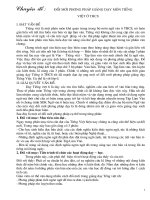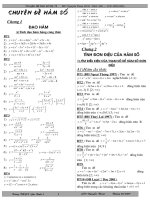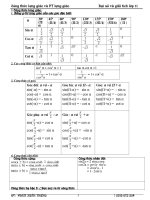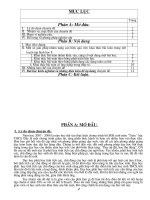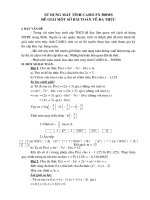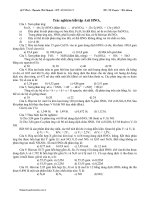Chuyen de Reported speech hay
Bạn đang xem bản rút gọn của tài liệu. Xem và tải ngay bản đầy đủ của tài liệu tại đây (229.32 KB, 5 trang )
<span class='text_page_counter'>(1)</span>Reported speech I. Những thay đổi trong lời nói gián tiếp: 1. Thay đổi động từ: Lùi 1 thì Direct Speech. Reported Speech. 1. Present Simple: V1 Ex1: Nam said “I am told to be at school before 7 o’clock” Ex2: He said “ I like beer”. 1. Past Simple: V2/ed EX1: Nam said (that) he was told to be at school before 7 o’clock. Ex2: He said (that) He liked beer. 2. Present Progressive: am/is/are+Ving Ex: He said “I’m watching TV”. 2. Past Progressive:was/were+Ving Ex: He said (that) he was watching TV. 3. Present Perfect: has/have + V3/ed Ex: He said “ I have just bought a new book”. 3. Past Perfect: had + V3/ed Ex: He said (that) I had just bought a new book. 4. Past Simple: V2/ed Ex: They said “ We came by car ”. 4. Past Perfect: had + V3/ed Ex: They said (that) they had come by car. 5. Past Progressive: was/were + V-ing Ex: He said “I was sitting in the park at 8 o’clock”. 5. was/were+V-ing or Past Perfect progressive Ex:-He said ( that ) he was sitting in the park at 8 o’clock” - He said ( that )he had been sitting in the park at 8 o’clock”. 6. Past Perfect: had + V3/ed Ex: She said “ My money had run out”. 6. Past Perfect: had + V3/ed Ex: She said ( that) her money had run out. 7. Future Simple: will +V without to (V0) Ex: Lan said “I’ll phone you”. 7. would + V without to ( Vo) Ex: Lan said ( that) she would phone me. 8. can Ex: He said “ you can sit here”. 8. could Ex : He said ( that) we could sit there. 9. may Ex: Mary said “I may go to Ha noi again”. 9. might Ex: Mary said ( that) shemight go to Ha noi again. 10. must Ex: He said “I must finish this report”. 10. must/ had to Ex: He said ( that)he had to finish that report. * Chú ý: Một số trường hợp không đổi thì của động từ trong câu gián tiếp: - Nếu động từ ở mệnh đề giới thiệu được dùng ở thì hiện tại đơn, hiện tại tiếp diễn, hiện tại hoàn thành hoặc tương lai đơn, thì của động từ trong câu gián tiếp vẫn không thay đổi Eg: He says/ he is saying/ he has said/ he will say, “the text is difficult”. He says/ is saying/ has said/ will say (that) the text is difficult. - Khi câu nói trực tiếp thể hiện một chân lý hoặc một hành động lặp lại thường xuyên, thì của động từ trong câu gián tiếp vẫn không thay đổi Eg: My teacher said “The sun rises in the East” My teacher said (that) the sun rises in the East. He said, ‘My father always drinks coffee after dinner’ He said (that) his father always drinks coffee after dinner - Câu trực tiếp có dạng câu điều kiện loại 2 hoặc loại 3:Giữ nguyên thi không thay đổi. Eg: He said; “If I knew her address, I would write to her” He said that he would write to her If he knew her address Eg: She said, “If I had enough money, I would buy a new bicycle.” She said (that) if she had enough money, she would buy a new bicycle. Eg: The teacher said, “If John had studied harder, he wouldn’t have failed his exam.” The teacher said (that) if John had studied harder, he wouldn’t have failed his exam. Tuy nhiên nếu lời nói trực tiếp là câu điều hiện loại 1 thì được chuyển sang loại 2 ở lời nói gián tiếp Eg: The advertisement said; “If you answer the questions correctly, you may win one million dollar” The advertisement said that I might win one million dollar If I answered the questions correctly. - Không thay đổi thì của: Could, would, might, should Ought, had better, need trong câu nói gián tiếp Nhưng must -> had to/ must Eg: She said; “I could do the homework She said the she could do the homework - Động từ trong câu nói trực tiếp có thời gian xác định: Eg: He said, “I was born in 1980” he said that he was born in 1980. 2. Thay đổi về đại từ nhân xưng, đại từ sở hữu, tính từ sở hữu:.
<span class='text_page_counter'>(2)</span> Đại từ nhân xưng Chủ ngữ Trực tiếp I we You. Gián tiếp He, she they They/ he/ she/ I. Tân ngữ Trực tiếp Me us you. gián tiếp Him/ her Them Them/ him/ her. Trực tiếp my our your. Gián tiếp His/ her Their Their/ his/her/ my. Trực tiếp mine ours yours. Gián tiếp Him/ hers Theirs Theirs/ his/ hers. Tính từ sở hữu. Đại từ sở hữu. 3. Thay đổi về từ chỉ thời gian và nơi chốn: Nhãm tõ trong c©u gi¸n tiÕp Nhóm từ trong câu gián tiếp that day/ that night Today/ tonight the day before/ the previous day Yesterday The morning before/ the previous morning Yesterday morning… the moth before / the previous month/ night last month/ night … the following day/ the next day Tomorrow The next morning/ the following morning Tomorrow morning… that month this moth The day before yesterday Two days before The day after tomorrow In two days’ time next month/ week. .. the month after / the following month/ week there Here then Now before Ago that This those These II. Những thay đổi cụ thể trong từng loại câu trong lời nói gián tiếp 1. Câu trần thuật trong lời nói gián tiếp: (Statements in reported speech) Eg: ‘We will have a test tomorrow’, My teacher said. S + said (to + O) + that S + V…… -> My teacher said (that) they would have a test the next day. S + told + O + that S + V…. *Note: Có thể sử dụng một số ĐT dẫn sau: thought, announced, explained, complained, believed… 2. Câu hỏi trong lời nói gián tiếp (Questions in reported speech) a. Yes/ no questions: S + asked / said “ Aux + S + ……….. ? ” Eg: Tuan asked Ba “Are you fond of watching television?” S + asked + ( O. ng ) + if / whether + clause Tuan asked Ba if/whether he was fond of watching television b. Wh-questions: S + asked / said “ Wh – word + Aux + S + .. ? ” S + asked + (O) + wh - word + clause. Eg: He said to me, “Why did you go with her father last week?” He asked me why I had gone with her father the week before.. 3. Câu mệnh lệnh trong lời nói gián tiếp (Imperative in reported speech) Khi đổi câu mệnh lệnh trực tiếp thành câu mệnh lệnh gián tiếp, cần lu ý: + §éng tõ têng thuËt lµ: ordered, commanded (ra lÖnh), requested, asked (yªu cÇu), told (b¶o lµm ) + Tân ngữ trực tiếp chỉ ngời nhận mệnh lệnh đợc nêu lên. + Hình thức mệnh lệnh của động từ trong câu mệnh lệnh trực tiếp đổi thành động từ nguyên thể. Eg: “Please wait for a minute.” The man asked me (+) He/ she + ordered + O + to V The man asked me to wait for a minute. commanded “Would you mind opening the door” she asked me. told.
<span class='text_page_counter'>(3)</span> asked requested. (-) He/ she + ordered + O + not to + V told asked. She asked me to open the door. He said to the waiter, “ Please bring me some hot water.” He told to the waiter to bring him some hot water. I said to her “Please shut the window.” I asked her to shut the window. Eg: “ Please don’t talk loudly”. He asked me not to talk loudly. He said “Don’t shut the door”. He asked me not to shut the door.. 4 . Reported speech with to infinitive - Khi lời nói gián tiếp là lời đề nghị, mệnh lệnh, ý định, lời hứa, lời yêu cầu,...động từ tờng thuật cùng với động từ nguyên mẫu theo sau thờng dùng để truyền tải nội dung lời nói trên. Động từ tờng thuật + tân ngữ + động từ nguyên mẫu (to-infinitive) *§éng tõ têng thuËt: ask, advise, command, invite, order, recommend, encourage, urge, warn, want, beg, persuade, remind , instruct … Ex: He said, “Would you like to go out for a drink?” --> He invited me to go out for a drink. ( invited sb to V . Mời ai …..) She said to me; “How about some coffee” --> She invited me some coffee “I will look after the house for you if you like” he said. -> He offered to look after the house for me if I liked ( Offered to V đề nghị ai làm gì…) Ex: She said, “Can you lend me your book?” ( asked sb to --> She asked me to lend her my book. V yêu cầu ai làm gì ? ) Ex: She said to me; “Don’t forget to ring me up tomorrow --> She reminded me to ring her up the next eveining ( Nhắc evening” ai làm gì ) Ex: “You should study harder,” my mother said. --> My mother advised me to study harder. ( Khuyên ai làm gì ) Động từ tờng thuật + động từ nguyên mẫu (to-infinitive) *§éng tõ têng thuËt:agree, demand, hope, promise, threaten, offer, refuse, decide... Ex: “All right, I’ll wait for you” he said -> He agreed to wait for me Eg: ‘No, I won’t lend you my car”. -> He refused to lend me his car.. Eg: ‘I’ll send you a card on your birthday”. -> He promised to send me a card on my birthday.. 5. Reported speech with gerund: (câu gián tiếp với danh động từ) - Khi lời nói gián tiếp là lời đề nghị, chúc mừng, cảm ơn, xin lỗi ….động từ tường thuật cùng với danh động từ theo sau nó thường dùng để truyền tải nội dung lời nói trên. Động từ tường thuật + V-ing....... * Động từ tường thuật:deny, admit, suggest, regret........... Ex: He said to me; “Let’s go home” Động từ tường thuật + giới từ + Ving…. -> He suggested going home. Ex: “I’ll help you with your physics exercise,” Peter said to Susan. Động từ tường thuật: : dream of, object to, insist on, complain about, think of, look forward to..... ---> Peter insisted on helping Susan with her physics exercise.. “I’ll drive you to the station. I insist,” Peter said to Linda. ---> Peter insisted on driving Linda to the station. “I want to pass the exam with flying colours,” John said.. ---> John dreamed of passing the exam with flying colours.. Động từ tường thuật + giới từ + tân ngữ + Ving…. * Động từ tường thuật: thank sb for, accuse sb of, congratulate sb on, apologize sb for, warn sb against, prevent sb from, stop sb from…. Ex1: “It was nice of you to help me. Thank you very much,” Tom said to you.. ---> Tom thanked me for helping him.. Ex2: “I’m sorry I’m late,” Peter said.. --> Peter apologised for being late.. Ex3: John said, “I heard you received the scholarship Congratulations!”. --> John congratulated me on receiving the scholarship.. Ex4: “Stay here! I can’t let you go out tonight,” her mother said to Jane. -> Her mother prevented Jane from going out that night. Ex5: “Don’t go out alone at night,” I said to Linda.. --> I warned Linda agaisnt going out alone at night.. Ex6: “You took some of my money,” he said.. --> He accused me of taking some of his money..
<span class='text_page_counter'>(4)</span> Exercise: Choose the best answer 1. He said he……………..at the “Ritz” Hotel. A.is staying B. has stayed C. was staying D. will stay 2. He asked me where I……………. A. have studied B. study C. am studying D. studied 3. I thought that I ………….my work at that time. A. shall finish B. will finish C. should finish D. will have finish 4. He wondered if she lived…………….with her parents. A. here B. there C. in there D. in here 5. They wondered………………she would come if it rained. A. what B. who C. whether D. then 6. He says he…………..at school two years ago. A. had worked B. works C had been working D. worked 7. Victor said he………….very busy. A. is B. will be C. was D. may be 8. I asked Hoa if she……………… Chinese. A. could speak B. speaks C. can speak D. has spoken 9. Tina asked me how long I……………..a teacher. A. have been B. had been C. am D. will be 10. She asked me…………….I liked pop music. A. if B. whether C. that D. A&B 11. The students asked if I was going to teach them physics……………… A. the next day B. next day C. day next D. the day next 12. I want to know he…………for her birthday. has bought B. buys C. had bought D. would buy A. what 13. She said she………….come to the party on Friday. A. won’t B. can’t C. doesn’t D. couldn’t 14. Chris A. asked postedme where my car……………. A. is B. will be C. was D. has been came 15. MrA. Jimissaid that he……………….happy with his new assistant. running weren’t B. isn’t C. wasn’t D. aren’t A. knew 16. He A. saidhad thatlost John……………….up his job. A. given B. have given C. had give D. had given A. has plays 17. She said that she ……………to learn to drive. A. is going B. was going C. go D. goes 18. I knew that he……………….a very clever man. A. was B. will be C. has been D. is 19. They said they…………….us if we needed. A. help B. helped C. had gone D. would help 20. She said she…………..the next week, but I never saw her again. A. will be back B. had been back C. would be back D. is back. 21. She said that she……………..there the year before. A. had gone B. went 22. I wonder………………the tickets are on sale yet.. C. would go. 23. She says she……………….the book. A. already finds B. has already found C. had already found 24. I was sure he…………….the letter.. D. goes. D. would already find. 25. He said he…………….to the station to see me off. 26. The policeman asked George where he……………so early. 27. He says that he……………..the laws of the country.. 28. They realised that they…………..their way in the dark. 29. My friend asked me who……………….the piano in the sitting room. 30. “Go home,” said the teacher to us. A. The teacher told us to go home B. The teacher said us to go home C. The teacher told us go home D. The teacher told to us to go home 31. “Don’t forget to clean your teeth,” said Granny to Helen..
<span class='text_page_counter'>(5)</span> A. Granny told Helen not forget to clean her teeth. B. Granny told Helen not to forget to clean her teeth. C. Granny told Helen to not forget to clean her teeth. D. Granny said Helen not to forget to clean her teerh. 32. “Please bring me some fish soup,” he said to the waitress. A. He asked the waitress bring him some fish soup. B. He asked the waitress to bring her some fish soup. C. He asked the waitress to bring him some fish soup. D. He asked the waitress bring her some fish soup. 33. “This man spoke to me on the road,” said the woman. A. The woman said that man had spoken to me on the road. B. The woman said that man has spoken to her on the road. C. The woman said that man spoke to her on the road. D. The woman said that man had spoken to her on the road. 34. I said to Nick: “Where are you going?” A. I asked Nick where was he going. B. I asked Nick where he was going. C. I asked Nick where is he going. D. I asked Nick where he is going. 35. “If I were you, I’d try to get a room on the top of floor,” he said. A. He advised me to try to get a room on the top floor. B. He advised me to try getting a room on the top floor. C. He offered me to try to get a room on the top floor. D. He suggested me to try to get a room on the top floor. 36. “I’ll wait for you if you like,” she said. A. She offered to wait for me. B. She said she’d wait for me if I liked. C. She suggested she waited for me. D. A&B are correct. 37. “Remember to switch off when you’ve finished,” he said. A. He reminded me to switch off when I’ve finished. B. He reminded me to switch off when I’d finished. C. He offered me to switch off when I’d finished. D. He suggested me to switch off when I’d finished. 38. “You’d better apologise for being late,” said my mother. A. My mother advised me to apologise for being late. B. My mother suggested me to apologise for being late. C. My mother suggested apologising for being late. D. My mother warned me to apologise for being late. 39. “Could you check the oil, please?” I asked the mechanic. A. I invited the mechanic to check the oil. B. I asked the mechanic to check the oil. C. I reminded the mechanic to check the oil. D. I warned the mechanic to check the oil. 40 Kate said: “Mike, do you like my dress?” A. Kate asked Mike if he liked her dress. B. Kate asked Mike if you liked her dress. C. Kate asked Mike if he liked your dress. D. Kate asked Mike if he likes her dress. 41. “Would you like to have lunch with me on Sunday?” he said to me. A. He offered me to have lunch with him on Sunday. B. He suggested me to have lunch with him on Sunday. C. He invited me to have lunch with him on Sunday. D. He reminded me to have lunch with him on Sunday. 42. “Don’t open your books,” the teacher said to the pupils. A. The teacher told the pupils to not open their books. B. The teacher told the pupils did not open their books. C. The teacher told the pupils not open their books. D. The teacher told the pupils not to open their books. Một số câu trích trong các dề thi TN THPT các năm 43.They asked me what did happen last night, but I was unable to tell them. A B C D 44. The doctor advised Robert ______ to lose weight. A. to take more exercise so that he could B. to take more exercise if he wanted C. that he takes more exercise D. that he should take more exercise in order that 45. The teacher told his students ______ laughing.. A. to stop. B. stop. 46. Jack asked his sister_______. A. where you have gone tomorrow C. where would she go the following day 47. Peter apologised_______. A. me for phoning not earlier C. for not phoning me earlier 48. She suggested ______ for a drink. A. being gone B. go 49. “Remember to bring your books,” he said.. A. He said I remembered to bring my books. C .He reminded me to bring my books.. C. stopped. D. stopping. B. where she would go the following day D. where you will go tomorrow B. not to phone me earlier D. not for phoning me earlier C. to go. D. going. B. He warned me against bringing my books. D. He asked me if I remembered to bring my books.
<span class='text_page_counter'>(6)</span>
